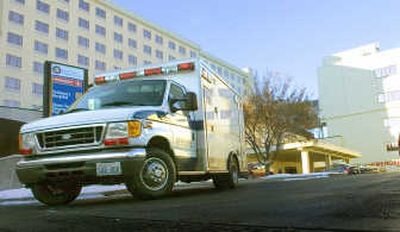State insurance plan in works

Spokane County has 50,000 people living without health insurance, a bleak number reflective of a larger problem that has prompted the state’s top insurance regulator to seek a new model that would offer all residents basic coverage.
“What we have now is unacceptable,” said Washington Insurance Commissioner Mike Kreidler. “It’s time to make some changes.”
Speaking at Sacred Heart Medical Center in Spokane, Kreidler advocated a “guaranteed benefit plan” proposal he expects to present to the state Legislature this winter.
Though the proposal is still being drafted, Kreidler used the number of uninsured state residents to make his pitch: He intends to create a state-sponsored plan that would provide coverage for catastrophic emergencies for all state residents. The plan also would pay for preventive measures such as screenings for cancer and diabetes, yearly checkups and immunizations for all state residents until they become Medicare-eligible.
State residents would also be able to purchase additional coverage through business-sponsored plans, where they’re available. Kreidler believes his coverage plan would help keep those private-plan rates lower.
He didn’t share specific details, such as the price tag, or how that tab would be paid. That will come later, he said.
Scott Forslund, spokesman for one of the state’s largest private insurers, Premera Blue Cross, said he’s unable to comment on Kreidler’s proposal because it hasn’t been released yet. Any changes to health care, however, must address the cost of service, not just insurance, he said.
Privately, Kreidler’s staffers and others said passage next year of a statewide universal health insurance plan is unlikely. The thought, however, is to advance the discussion and find a state solution rather than wait for the federal government to act.
It is the sort of initiative that would have helped pay the bills for uninsured patients such as Michele Dillon.
Last March, after coping with worsening stomach pain, the 21-year-old student at Spokane Falls Community College sought help.
She was admitted to Sacred Heart and surgeons removed her appendix. Her overnight stay at the Spokane hospital cost $11,000. She did not have insurance, caught in the cycle of switching jobs for better pay.
“I had never been to the hospital,” she said, “never had broken bones or anything.”
Sacred Heart discounted her bill from $11,000 to $8,000 and then wrote off the entire amount owed as charity care.
Forcing her to pay, along with $2,000 more owed to the surgeons and anesthesiologist, may have turned her case into this statistic: Every 30 seconds one American files for medical bankruptcy, Kreidler said.
“I just really appreciate that the hospital covered this for me,” she said.
There are 700,000 people without health insurance in the state. The cost of treating them last year was $584 million.
Ryland “Skip” Davis, chief executive officer of Providence Health Services, listened to Kreidler and agreed with the concept of finding at least some coverage for all state residents.
“These things are not inexpensive and not easy,” Davis said.
Sacred Heart has been stung by the rising costs of treating uninsured patients. The financial hit has risen 19 percent during the past four years, said Elaine Couture, chief operating officer.
Davis worries that the imbalance will upset what he called an unspoken code among medical professionals.
“Physicians and hospitals have always understood their greater social responsibility of giving back,” he said, noting that providers have not historically blushed at writing off about 5 percent to 10 percent of their charges. If those write-offs turn to 10 percent to 20 percent “we may break a good thing,” Davis said. “It’s criminal that people can’t get access to some kind of primary care and preventative care insurance.”